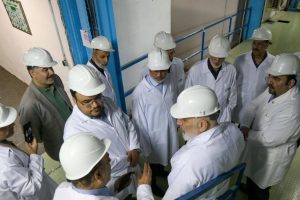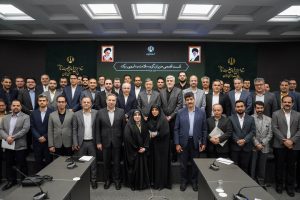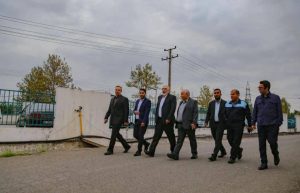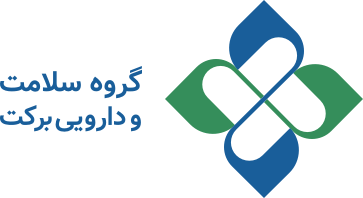
Transition from oil economy: A new horizon in Iran’s pharmaceutical industry
Barekat Health & Pharmaceutical Group: Leading the Charge in Economic Transformation dependence on oil revenues, the pharmaceutical industry has become a critical focus, particularly driven by knowledge-based and domestic companies.
This sector’s development is emblematic of Iran’s broader economic transformation, highlighting its capacity to meet domestic demands while expanding non-oil exports. The pharmaceutical industry’s growth underscores the nation’s scientific and research strengths in the fields of health and medicine.
With a population of over 80 million, Iran’s need for pharmaceutical products is immense, driving the nation to continuously invest in this sector. Advances in medical science, biotechnology, and nanotechnology have enabled the country to produce complex medications, positioning Iran as a leader in the region. This transformation is crucial, as the pharmaceutical industry now serves as both a vital source of foreign currency and a means to bolster Iran’s scientific and economic independence.
Economic Diversification: Shift Away from Oil
Historically, Iran’s economy has been centered on oil, creating a dependency on global oil markets and prices. However, sanctions targeting the oil sector prompted Iranian officials to accelerate the diversification of the economy. In this context, the pharmaceutical industry emerged as one of the most strategic non-oil sectors.
Investment in the pharmaceutical and biotechnology industries has surged, with knowledge-based companies at the forefront of producing cutting-edge medications, especially biopharmaceuticals. These companies are not only fulfilling domestic demand but are also positioning themselves as key exporters in the global market, contributing to Iran’s long-term goal of expanding non-oil exports.
From Oil to Pharmaceuticals: Success Stories
- Barekat Pharmaceutical Group:
A leading example of this transformation is the Barekat Pharmaceutical Group, which has played a significant role in reducing Iran’s reliance on imported specialized medicines. Through investments in biotechnology, Barekat has produced advanced drugs, including insulin, anticancer treatments, and biopharmaceuticals. This success has strengthened its position in the domestic market and bolstered its capacity for pharmaceutical exports through international collaborations.
- Biopharmaceutical Innovations:
Iran’s progress in biopharmaceutical production is remarkable. Companies like CinnaGen Pharmaceutical have made their mark both domestically and internationally by producing treatments for autoimmune diseases and cancer. Leveraging advanced technologies, these companies have managed to reduce production costs while enhancing access to cutting-edge treatments.
- Vaccine Production: Another area of pharmaceutical advancement is vaccine production. Iran has become one of the few countries in the region capable of mass-producing vaccines, including those for COVID-19. This capability not only addressed domestic needs during the pandemic but also established Iran as a major regional vaccine producer.
Knowledge-Based Companies: Catalysts for Pharmaceutical Growth
Iran’s shift from oil to pharmaceuticals is deeply intertwined with its strategy of fostering a knowledge-based economy. Science-driven enterprises are crucial to the development of innovative pharmaceutical products. In recent years, the government has introduced numerous policies to support the growth of these companies, offering financial incentives, tax exemptions, and research infrastructure development.
By collaborating with universities and research centers, these knowledge-based companies have spearheaded the production of advanced drugs, particularly in biotechnology and nanotechnology. For example, Iranian firms have made notable strides in developing drug-delivery nanoparticles, which offer precision treatment for chronic diseases and cancers, significantly enhancing therapeutic outcomes.
Strategic Drug Production & Export
Amid economic sanctions and international pressures, the domestic production of critical medications, including anticancer drugs and insulin, has gained special importance. Companies like the Barekat Pharmaceutical Group have taken significant steps in meeting these needs, reducing dependency on foreign imports.
Additionally, Iran has ambitious plans to export strategic medications to key markets in the region, such as Iraq, Afghanistan, Syria, and the Gulf states. By focusing on these markets and strengthening scientific collaborations, Iran aims to solidify its presence as a leading pharmaceutical exporter in the region.
Research and Development: Engine of Pharmaceutical Innovation
Investment in research and development (R&D) is essential for the continued success of Iran’s pharmaceutical industry. R&D drives innovation, leading to the discovery of new drugs and the improvement of production processes. In Iran, numerous pharmaceutical and knowledge-based companies are conducting advanced research in areas such as biotechnology, gene therapy, and nanotechnology. Collaborations with prestigious universities and research institutions have further bolstered the country’s R&D capabilities.
With a vast network of reputable academic and research institutions, Iran is well-positioned to continue its advancement in pharmaceutical sciences, playing a critical role in both domestic and international markets.
Challenges and Opportunities
Despite significant achievements, Iran’s pharmaceutical industry faces challenges, particularly due to international sanctions that limit access to advanced pharmaceutical technologies and raw materials. However, the country has responded by leveraging domestic capabilities and forging regional and international collaborations.
Looking ahead, Iran’s pharmaceutical industry holds immense potential. Regional markets in the Middle East, Central Asia, and Africa, with their growing demand for modern medications and vaccines, present substantial opportunities for Iranian exports. By capitalizing on its existing infrastructure and scientific expertise, Iran is poised to expand its reach in these markets.
Conclusion: A Bright Future for Iran’s Pharmaceutical Industry
Iran’s journey from an oil-dependent economy to one centered on pharmaceuticals reflects not only economic resilience but also the country’s scientific and technological advancements. By investing in research, nurturing knowledge-based companies, and fostering international collaborations, Iran’s pharmaceutical sector has achieved remarkable progress in the production of complex medications and biopharmaceuticals.
As Iran continues to invest in its R&D capabilities and expand its pharmaceutical exports, the country has the potential to become a major player in the global pharmaceutical landscape. This transformation will not only enhance the well-being of its population but also secure Iran’s place as a scientific and economic leader, reducing its reliance on oil and boosting its standing in the global economy.
-
Afghanistan’s Ministry of Public Health Delegation Meets Barkat Pharmaceutical Group Executives

-
Voice of Life in World of News — Redefining Health Journalism in the Information Age

-
Senior Health Officials & Barkat GD Visit Sobhan Oncology

-
Barkat Group specialized meeting

-
Safa Appointed as Barekat General Director

-
Barekat Health & Pharmaceutical Group at the 10th Iran Pharma Exhibition

-
Ali Safa visits Sobhan Oncology & Sobhan Darou

-
Pirsalehi & Safa visit Saman Daroo 8 Knowledge-based Company

